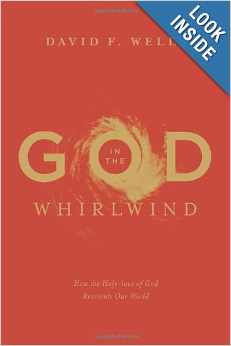I have been blessed by David Wells for many years. This book, God in the Whirlwind, is the capstone of a particular writing project, one that began with No Place for Truth. I read that book in 1994, and have been faithfully reading his other contributions as they came out. The other books, well worth readying, are God in the Wasteland, Losing our Virtue, The Courage to Be Protestant, and Above All Earthly Pow’rs.
It is not too much to say that this book is his positive affirmation of what he believes, a fitting conclusion to his sweeping critiques of all the things he doesn’t believe — which he dissected so ably in the earlier books.
So I would like to make three observations about this book. The first is that Wells draws a sharp contrast between that which comes “from above” — the gospel of grace — and that which comes “from below” — everything else. This is actually the issue in all comparisons of different faiths, approaches, religions, or worldviews.
A second important emphasis is the distinction he draws between redemption and therapy. We now live in a therapeutic culture, one in which forgiveness is not needed, but treatment is. The treatment might come in those little capsules beloved of modernists, or it might come from varying doses of magnesium, randomly administered by people who want Facebook for a doctor. We want fixes, not forgiveness, and so Wells uses the phrase holy-love to discuss what God is like. When we separate holiness from love, all we get are legalisms. When we separate love from holiness, we get the therapeutic dealer offering us the joy pills.
The third thing to be observed is how Wells simply states, faithfully and simply, the gospel. The subtitle of the book is “How the Holy-love of God Reorients our World.” The bulk of the book is simply a sturdy and very competent walk through the basic tenets of the Christian gospel.
I have only one complaint, which in the scope of his work, amounts actually to something of a quibble. I trust his observations about the way our culture is circling the drain, but his anchor points for these observations are frequently polls and surveys. I wish that he would turn his critical eye on that.
With that gotten out of the way, I commend this book highly. It is food for the soul. And given the astute observations made in all his earlier works, it is a table prepared for us in the presence of our enemies.


